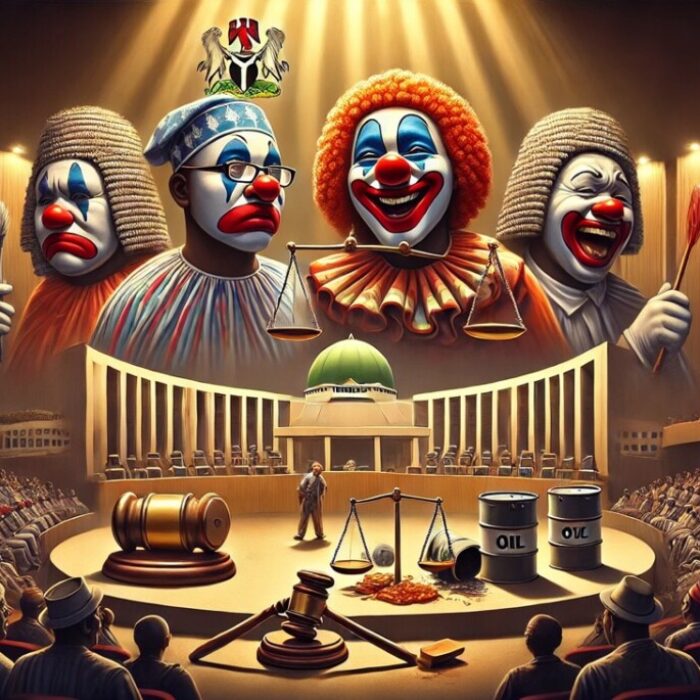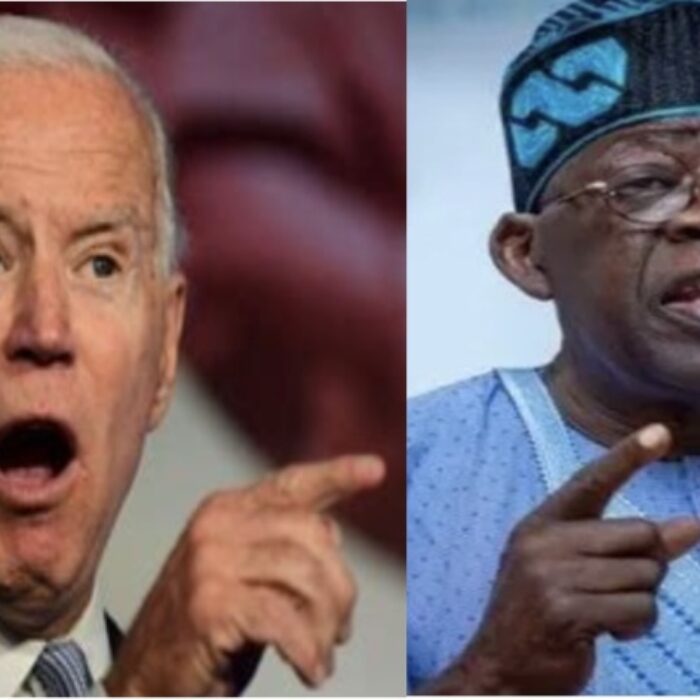By Nnaoke Ufere, PhD
I could smell the stench of desperation from 6,000 miles away in Washington, D.C., when, on March 20, Atiku Abubakar and a confederacy of castoffs unveiled yet another so-called “coalition” of opposition parties.
Sharing the stage with Atiku were Peter Obi’s spokesman Yunusa Tanko, Nasir El-Rufai, Babachir Lawal, and CUPP Secretary Peter Ahmeh. Notably absent, though reportedly coalition partners, were Rotimi Amaechi, Kayode Fayemi, and former APC Chairman Abdullahi Adamu, who all sent in apologies.
If there was any lingering doubt about the emptiness of this alliance, it was swiftly crushed by its glaring lack of depth, clarity, or conviction. This coalition isn’t anchored in fresh ideas, coherent ideology, strategic foresight, or any meaningful vision for Nigeria’s future. It is not a meeting of minds but a gathering of grievances, held together by blind ambition, not passion to solve the nations complex problems.
Instead, it is fueled by a single myopic obsession: to unseat Tinubu in 2027, regardless of the lack of leadership quality among coalition figureheads, the glaring character and credibility deficits they carry, or the long-term consequences for our nation.
Yes, our recent nationwide survey of 2,500 diverse Nigerian respondents shows that if the presidential election were held today, 80% would vote against re-electing Tinubu. Whether the election is rigged or not, the message is clear: Nigerians are ready for Tinubu to go. Nigerians need new leadership.
To defeat Tinubu and finally break free from decades of betrayal, broken promises, and failed leadership, Nigeria doesn’t need another hollow alliance of these compromised career politicians, whose only common thread is raw selfish ambition and a ruthless lust for power disguised as patriotism.
Atiku, Obi, and El-Rufai are not the leaders Nigeria wants, nor the ones it needs, no matter how loudly they promote their so-called coalition or how desperately they try to fake unity of purpose. Their track records, contradictions, and personal ambitions speak louder than their carefully crafted press statements.
What the nation truly needs is a bold, authentic, and visionary coalition of liberators, leaders driven not by ego, grievance or desperation but by a shared commitment to rebuild Nigeria from the ground up with integrity, clarity, and purpose.
Atiku, Obi, and El-Rufai are not those leaders. They are relics of a broken system, products of the very dysfunction they now claim to oppose. They have had their turns, squandered public trust, and left behind records stained with inconsistency, opportunism, and self-preservation. Dressing them up in another coalition as reformers is not just dishonest; it’s dangerous.
That is why our nation must reject this coalition outright and cast off the tired politicians propping it up. We must break free from the grip of recycled leaders and chart a bold new path forward. We must demand a new generation of leadership, men and women who place Nigeria above personal ambition, who possess both the competence to govern and the moral courage to dismantle the toxic machinery of the old order. We need relentless problem solvers, leaders with the vision, pragmatism, and clarity to end Tinubu’s and the APC’s reign and lead Nigeria into a new era.
This new era requires more than just a change in names; it demands a total departure from the corrupt culture that has defined our politics for decades. We need leaders who are not products of that cesspool, individuals with the integrity to confront corruption and the expertise to defeat it, leaders who are not entangled in the very system they claim to challenge.
These must be leaders capable of rebuilding Nigeria on the foundations of unity, justice, and inclusion. Leaders who see our diversity not as a wedge to divide us, but as a strength to be harnessed. They must have the courage to break from the failures of the past and the foresight to chart a bold, transformative course forward.
That transformation must be real and measurable. We need leadership that will empower states and local governments with genuine autonomy. Leaders who will deliver reliable, affordable electricity around the clock, overhaul our failing education system, rebuild our crumbling infrastructure, and restore security across every corner of the nation.
We need leaders who will make Nigeria truly self-sufficient in food production, who will ignite inclusive economic growth by revitalizing domestic markets, boosting productivity in essential services, and building a resilient, innovative, export-driven economy. They must deliver real, lasting prosperity that reaches every region, leaving no community forgotten and no citizen behind.
And yes, such transformative leaders do exist. They are rising, not from the ruins of the old guard, but from the ranks of those who still believe in Nigeria’s promise. Very soon, they will step forward, not as saviors seeking glory, but as warriors for our nation and our people. They will contest the presidency not to possess power, but to redeem it, ready to lead Nigeria into a new era of justice, progress, and national renewal.
I have outlined this vision in these pages before: a Coalition of Liberators, not forged out of convenience or shallow opposition to Tinubu, but grounded in deep conviction, shared sacrifice, and a genuine desire to rescue and rebuild Nigeria. This is not a gathering of recycled political opportunists chasing power, but a union of courageous, principled leaders who embody integrity, competence, and compassion.
The Coalition of Liberators (CoL), which will be announced in due course, represents authentic leadership anchored in a clear and bold vision. It seeks to dismantle the old, corrupt order and lay the foundation for a just, united, secure, and prosperous nation, one that works for every Nigerian, not just the privileged few.
The harsh truth is that none of them—Atiku, Obi, or El-Rufai—comes even close to the kind of leadership this country desperately needs. They lack vision. They lack solutions. And they lack the moral courage and intellectual clarity required to steer a nation in crisis. At a time when we cry out for bold, principled, and competent leadership, what these men offer is the same old mediocrity, wrapped in unchecked ambition.
Handing power to any of the men fronting this so-called coalition would be an even greater tragedy. It would simply mean replacing one terrible administration with another, equally inept, equally corrupt, merely dressed in different colors. This is not progress; it is failure recycled, rebranded, and resold.
Together, they offer no real alternative to Tinubu’s ongoing devastation. They are merely different faces of the same corrosive force that has crippled our nation and oppressed our people for decades. To them, the presidency isn’t a solemn call to service or a platform for solutions. It is a trophy, a personal milestone in a lifelong pursuit of power, privilege, and self-gratification. They don’t seek to lead; they seek to possess.
This mindset is not new. We have seen its consequences, most recently with Tinubu, and before him, Buhari. When blind ambition is paired with a bloated sense of entitlement, the result is never nation-building. It is ruin. It produces leaders who view power not as a duty to serve but as a birthright to exploit; who govern not to uplift, but to oppress, enrich, and avenge. The outcome is always the same: abandoned citizens, degraded institutions, looted wealth, and a nation plunged deeper into chaos.
This is why Atiku, Obi, and El-Rufai cannot be the future. Their branding may differ, their rhetoric may shift with the political winds, but at their core they share the same malignant political DNA: power without principle, ambition without direction, promises without delivery, and leadership utterly devoid of accountability.
Choosing any of them to replace Tinubu would not signal progress. It would be an existential blunder, a reckless plunge that drags our long-suffering citizens from disillusionment into outright catastrophe. Trading one face of dysfunction for another does not move the country forward; it only deepens the rot.
Look closer at their political trajectories, and the farce reveals itself in full. Each of these men has constructed his public persona by tearing down the others, relying on deceit, manipulation, and zero-sum tactics to climb the political ladder or jump parties when their narrow interest is not being served. They have jumped from one party to another like political whores, trading principles for proximity to power, loyalty for leverage.
Any talk of coalition among them is not just a contradiction; it is a cynical, politically toxic alliance built on mutual distrust and transactional self-interest. Their partnerships are not forged in shared vision or ideology, but in short-term opportunism and the self-centered pursuit of power at all costs.
Attempting to force them into a single alliance is like trying to make lions, tigers, and zebras coexist together in the same cage. It is unnatural, volatile, and doomed to chaos. Trying to bring them together under one banner would be like pressing together magnets of the same pole. They will inevitably repel each other.
Take Obi, for instance. He rose to prominence in 2023 by casting himself as the moral and political antithesis of Atiku and the PDP, who he portrayed as symbols of corruption, cronyism, and recycled failure.
His campaign did not merely reject them; it denounced them, earning him thunderous applause from “Obidients” who believed he represented a clean break from the old order. Now, like a prodigal son returning to the very den he once fled, he inches back toward the PDP’s hornet’s nest. Was it all a performance? A carefully choreographed act of immaculate deception?
Obi has a lot of explaining to do, or the Obidients will abandon him as swiftly as they embraced him. Loyalty built on hope can just as easily collapse under betrayal.
Obi’s emergence as a card-carrying partner in this coalition only confirms the depth of his duplicity. It exposes the hollowness of his previous posturing and underscores why he cannot be trusted.
Far from being the outsider he claimed to be, he now stands shoulder to shoulder with the very figures he once vilified. This betrayal of principle reveals a man driven not by conviction but by calculation, unfit for the office he so desperately seeks.
That 2023 rupture between Obi and Atiku, however, came at a steep political cost that makes any reunion between them the equivalence of Julius Caesar and Brutus trying to form a coalition, a partnership too burdened by betrayal to ever truly hold. This deep rift is further compounded by the lingering resentment within Atiku’s camp.
Atiku and the PDP stalwarts have not forgiven Obi, and likely never will, for what they view as his betrayal during the 2023 presidential election. By splitting the voter base and drawing away critical support in key states, party leaders believe Obi seriously damaged Atiku’s chances in a race he might have won if Obi had remained loyal to the party and its candidate.
The consequences of that move still echo within the PDP. Within party circles, Obi’s political currency is not just diminished; it’s effectively worthless. Does Obi think Atiku has forgotten? Does he believe a man like Atiku, steeped in entitlement and obsessed with his legacy, will ever forgive such a public betrayal and humiliation?
This brings us to the current façade. Let’s be clear: Atiku and the PDP are not seeking partnership with Obi. They are seeking revenge, thinly veiled as reconciliation or coalition. Atiku’s goal is not to uplift Obi, but to neutralize him, to absorb and render him politically impotent.
In truth, this is not coalition-building. It is consolidation through co-optation, a disarmament disguised as an embrace. And Peter Obi, ever hungry for relevance and approval, may walk straight into the trap, mistaking an ambush for an alliance.
Much of that resentment stems from the manner in which Obi exited the PDP. His abrupt departure, a move Atiku and PDP kingmakers continue to reference with thinly veiled bitterness, was seen as impulsive, opportunistic, and marked by a profound sense of disloyalty and spite, according to PDP insiders interviewed for this article.
As a result, Atiku’s past condemnations of Obi have taken on a deeper significance. They reflect a deeply rooted belief, shared by himself and the PDP, that Obi lacks the political maturity, collaborative instinct, and leadership readiness required to be president. No amount of coalition rhetoric can credibly conceal this underlying disdain. To the PDP leaders and grassroots supporters, Obi remains a persona non grata.
Now imagine PDP loyalists embracing Obi, the same man who publicly condemned their party as a cesspool of corruption and played a critical role in Atiku’s defeat in 2023. Imagine Obidients, who once hailed Obi as the embodiment of generational change and clean politics, now being asked to align with the very forces they rose against.
Complicating matters further is the role of Nasir El-Rufai, whose incendiary, isolationist, and sectarian rhetoric, particularly his well-documented contempt for Christians during the 2023 presidential election, has rendered him politically radioactive to Obi’s core base, which is predominantly made up of Igbo Christians and youth-driven movements.
Adding to this tension is El-Rufai’s long-standing animosity toward Atiku Abubakar. He has consistently framed Atiku’s alleged corruption as a defining and disqualifying flaw.
At one point, El-Rufai declared that Atiku was plagued by “corruption demons,” linking him directly to multiple bribery scandals, including explosive revelations from a U.S. Senate report detailing suspicious financial activities. At the time, El-Rufai aligned himself publicly with Bola Tinubu, calling on Atiku to face the allegations head-on.
Crucially, these were not offhand remarks or political jabs; they were sustained, scathing attacks aimed at delegitimizing Atiku’s presidential ambitions and calling his moral compass into question. Though Atiku was never formally indicted, El-Rufai’s role in cementing public suspicion was both intentional and influential.
Given this backdrop, for these same figures to now flirt with political partnership is not just cynical; it is a brazen insult to public memory, laying bare the hollow pragmatism and raw desperation that define their newfound alliance.
Efforts to contact Atiku, Obi, and El-Rufai for comment were unsuccessful.
The Prisoner’s Dilemma: Why the Coalition is Dead on Arrival
To understand why this so-called coalition is doomed before it even begins, we need only turn to basic game theory, specifically the Prisoner’s Dilemma. The premise is simple: when self-interested players are faced with the option to cooperate or defect, and the payoff for betrayal outweighs the benefits of loyalty, defection becomes inevitable.
This perfectly captures the dynamics between Atiku, Obi, El-Rufai, and any other ambitious contender eyeing 2027. Each of them believes he alone deserves the presidency. In their minds, the others are stepping stones, not partners. The rational move, then, is not cooperation but calculated betrayal—striking when the timing serves them best.
In this environment, trust is a fantasy. Cooperation is a myth. Each player is incentivized to undermine the others, believing that by doing so, he increases his own chances of emerging as the lone victor. The predictable outcome? Mutual destruction.
Tinubu won’t need to defeat them; they will defeat themselves. From this perspective, it becomes painfully clear that what they are attempting to build is not a coalition at all. It is a political battlefield dressed up as a conference room.
While Atiku, Obi, and El-Rufai maneuver against each other in a game of political chess, Tinubu will be quietly consolidating power and presenting himself as the stable alternative to their disorder. Rather than challenging his grip on power, their fragile coalition only strengthens it, handing him a gift-wrapped advantage.
In the end, this so-called coalition is not a beacon of hope but a pact of desperation, a last-ditch effort by yesterday’s men to cling to relevance. Nigeria cannot afford another recycled alliance built on ambition without vision.
What we need is not a coalition of desperadoes, but a coalition of liberators, leaders with the courage to break from the past and the clarity to build a future worthy of the Nigerian people. The time for half-measures is over. The hour for true transformation has come.



